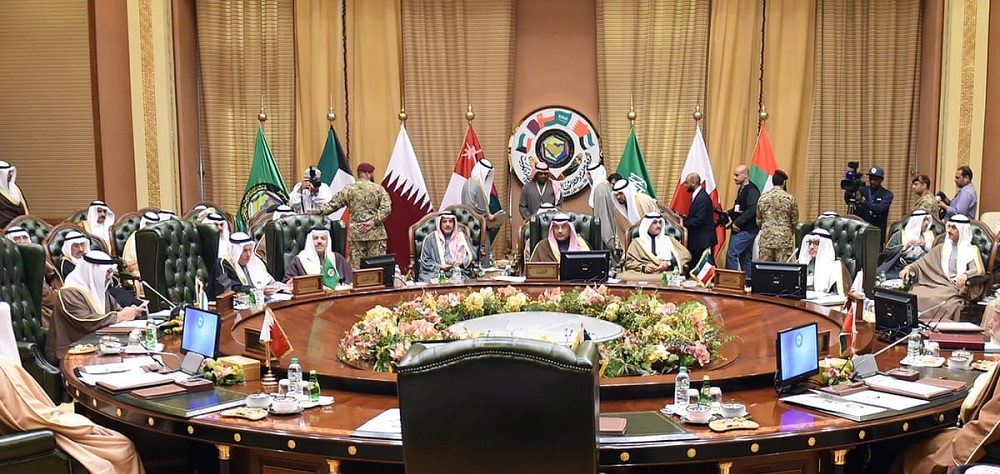Alwaght- In the wake of the 39th anniversary of the (Persian) Gulf Cooperation Council, the Arab bloc is witnessing heated diplomatic moves. The exchange of visits and phone conversations all bear witness to these moves. That is while the differences among the members remain in place and in the recent months there were signs of emergence of even new cleavages.
Since the beginning, the (P) GCC had a nature bearing potential disputes among its member states, most important of them are on borders. Additionally, latent disputes erupted between Saudi Arabia and the UAE as the two countries intervened in Yemen, and as the war continued, some members supported opposite sides. Also, Oman is severely concerned about the type of the UAE moves in southern Yemen and the clash of interests of the two Arab nations signal new disputes inside the Arab bloc.
Reports recently revealed that the UAE leaders were interested in seeing Ass’ad bin Tariq as the new sultan of Oman instead of Haithem bin Tariq, disclosing part of the differences between Abu Dhabi and Muscat. A decline by the new Omani sultan to call the UAE leaders on the threshold of the holy month of Ramadan add to the speculation that the tensions are rising between them. The situation comes as the UAE sentenced to long terms in jail a number of Omani nationals on charges of espionage.
On the other side, despite the claims that the UAE and Saudi Arabia are fully coordinated on the Yemeni case, proxy forces of the two invading countries several times clashed, demonstrating conflict of policies of Abu Dhabi and Riyadh in Yemen. A recent announcement of autonomy by the UAE-backed Southern Transition Council (STC) increased the speculation about emergence or increase of already-existing differences between the two Persian Gulf Arab monarchies.
What is clear is that the crisis between Qatar and Saudi Arabia-led bloc is not the only challenge the Cooperation needs to find a solution for. In fact, the council is facing new crises that although are not as big as the Qatari case, they cannot be deemed insignificant.
Different aims moving through same route
A look into the contacts and negotiations among the Arab leaders may signal that their total focus is to find a solution to the crisis with Qatar. But other objectives behind these diplomatic moves should be taken into consideration.
At a time the old differences are deteriorating with the rise of new conflicts and this gives reasons to the experts to predict the collapse of the (P) GCC, the member states seem to have no alternative to the type of their cooperation with each other and are trying to return the situation to its normality to facilitate movement towards the initial objectives of the council and move to a stable security order in the region.
Although the aim of all of the efforts of some member states, like Kuwait and Oman, to settle the Qatari crisis is to back to the Cooperation Council normal conditions, even the most optimistic speculations suggest that the bloc cannot return to its normality.
For example, Saudi Arabia is pressing to dictate its favorable policies to the members to build an order favored by the Riyadh rulers. But it faces Qatar that promoted self-confidence after beating the Saudi-imposed blockade and successfully managing the crisis with the help of regional countries and will certainly choose independence of decisions.
Saudi Arabia has also the UAE as a challenge. Abu Dhabi is struggling to improve its role in the council, pushing Saudi Arabia to wall in the council despite seeing a role of big brother for itself.
These are other conflicting policies and goals held by the member states that will definitely be followed even if the situation returns to normal.
The type of the diplomatic moves and stances of the Arab states signal that they have no alternative to the council should they decide to ditch it. They seek to build a new order using the capacities of the council by just some changes. All these goals pass from a single route and its is restoration of the normal conditions of the council. This takes settlement of Qatar crisis. The members have so far not reached a common vision to end the four-years-long standoff.
The outlook for the Cooperation Council
Although a considerable portion of the diplomatic moves by the Arab leaders concentrates on finding a solution to Qatar crisis, the inter-member differences along with the complications of the Qatari cases which show no prospects of easy and short-term solution accentuate the point that the bloc is unable to return to its normal status at least in the short run.
Even if Qatar crisis ends and the council sees normalization, there will be no clear outlook for cooperation among the members with the presence of sticking points that are mainly a product of the regional developments in the past few years.
Although economic partnership advancement is possible, especially that the current chief has long experiences in economic and business terms and the damage caused by the coronavirus outbreak requires a collective business partnership to heal the economic consequences, security and political cooperation is far beyond reach at least in the short term.
Qatar case is not the only case open for the (P) GCC addressing. Actually, the regional bloc faces accumulation of crises and brewing of serious differences among the members. Furthermore, while the diplomatic movement of the members, which show they are not considering an alternative to the council, seek to normalize the relations in the bloc via putting an end to the Saudi crisis with Qatar, political observers suggest that normalization of the situation inside the Cooperation Council is not the ultimate aim of the members. Some countries seek to take steps to change the current structure and order to make their way to the objectives once normalization is achieved.



























